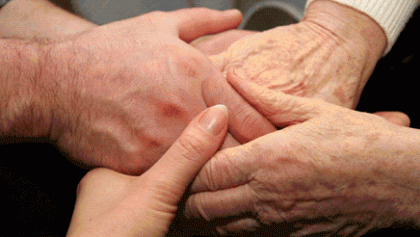

ENCODE
Supporting caregivers of Persons with dementia
ACCESS
We are implementing a behavioral intervention entitled ENCODE to support family caregivers of hospice patients with dementia to improve pain management. We are examining the effectiveness of the intervention in reducing anxiety and depression for family caregivers, improve quality of life and patient pain. This work is based on extensive development of the intervention that combines pain management challenges, educational components and elements of problem solving therapy.
Access for Cancer Caregivers to Education and Support for Shared Decision Making
We have designed a pragmatic randomized controlled trial to test an intervention for a population seldom studied―hospice family caregivers―targeting an identified need (decision-making), and measuring a core set of caregiver outcomes (anxiety, pain knowledge, and patient pain). This project is the first shared decision making intervention in the hospice setting. We are using the Facebook platform to improve emotional support and caregiver knowledge to better prepare caregivers for participation and decision-making.

PISCES
Problem-Solving Intervention to Support Caregivers in End of Life Care Settings
The study of the PISCES intervention examines the use of technology to deliver a problem solving therapy intervention to hospice caregivers. The study is a three arm randomized clinical trial that examines the effectiveness of the intervention delivered in person to a group receiving the intervention in a hybrid fashion (sessions in person and via video-conferencing) and to a group that received an enhanced intervention called PISCESplus that includes positive reappraisal elements. The study aims to examine whether problem solving therapy affects caregivers’ quality of life and anxiety, and whether the video-conferencing delivery is comparable to in person delivery. Cost effectiveness of the intervention and ways to ensure its translation to practice are also investigated as part of this project. The PISCES intervention has been tested in a series of randomized clinical trials both in the hospice setting as well as more "upstream" in outpatient palliative care settings.

FIND
Family Involvement in Nursing Home Teams to Support Decision-making
Research has found the quality of care of end-of-life care in nursing homes to have many challenges. It has also been documented that family members, especially those living at a distance, want to be involved in the care of their resident and family support can be beneficial to residents. Family members’ involvement in decision-making in the nursing home setting improves outcomes for residents with life-limiting illnesses. This project seeks to facilitate shared decision making (SDM) among family members, residents with life-limiting illnesses (who are not enrolled in hospice), and the nursing home care team. Our overall research question (RQ) asks: To what extent are outcomes for family member and residents with life limiting illnesses associated with SDM via web-conferencing in the nursing home?
ACTIVE
Assessing Caregivers for Team Intervention via Video Encounters
Assessing Caregivers for Team Intervention via Video Encounters (ACTIVE) sought to use web-conferencing technology to allow hospice family caregivers to attend hospice care plan meetings. Using a randomized controlled trial design we recruited 450 caregivers to evaluate the effect of attendance on caregivers understanding of pain management. We found family valued the meetings, felt closer to hospice staff as a result of attending, and felt more confident of the care they provided. Hospice staff valued the input of family members.